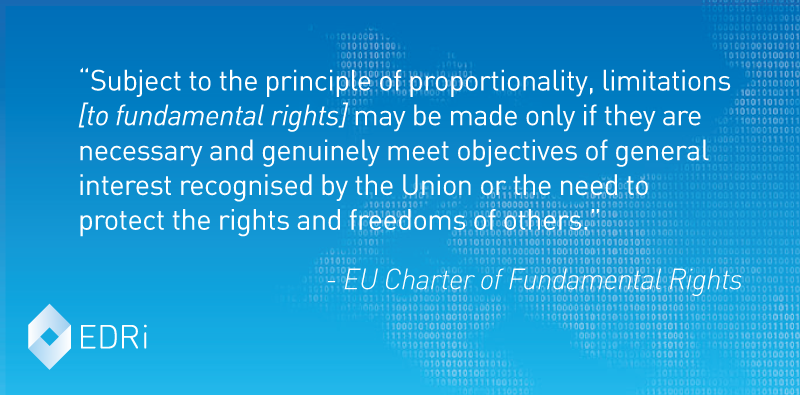European fundamental rights to be regulated by companies
Today, on 25 May, the European Commission published two new proposals of their Digital Single Market strategy: its update of the Directive on audiovisual media services (ADVMS) and a Communication on online platforms, together with the evidence document for the platforms Communication.
The Communication on Platforms worries us the most. For instance, the proposals with regard to the regulation of “illegal” “or harmful” content are hugely disturbing. The Commission seems willing to completely give up on the notion of law. Instead, regulation of free speech is pushed into the hands of private corporations.
Demanding that multiple companies in multiple jurisdictions arbitrarily implement whatever national law or other preferences they choose is a sure-fire way of building new barriers in the “Digital Single Market”
said Joe McNamee, Executive Director of European Digital Rights (EDRi).
The Communication repeats “voluntary measures” almost like an ideological mantra – whatever the question is, the answer is always “platforms can fix it”. What about public authorities’ responsibilities to enforce the law?
The Commission refers to the EU Internet Forum as an “important example”. Indeed it is, although not in the way the Commission meant.The EU Internet Forum is a highly-untransparent Commission-driven project, undertaken in cooperation with exclusively US online companies (and not even all of the relevant ones!) to tackle terrorist content and hate speech online. The Commission describes it as a “multi-stakeholder” model, even though only the Commission and three US companies were involved in drafting the outcome.
The Communication also talks about limitations of liability for platforms when they take “good faith” law enforcement measures. Sounds familiar? The ill-fated Stop Online Piracy Act (SOPA) that was abandoned after huge protests in the USA proposed exactly the same thing. The good news is that, for now, no new liability measures are being proposed to coerce platforms into taking these measures. However, there are threats of “formal notice and action” procedures that make it clear that law will be used if the companies do not police European citizens extensively enough.

Today’s Communication offers “evidence” is either misrepresented or moulded to suit pre-existing policies. The Commission appears eager to ensure that the online monopolies monitor online activity, take action to remove any content that creates legal risks for them, and arbitrarily police content to “protect” unspecified and undefined “societal values”. Not a word is wasted on review processes, effectiveness, proportionality, possible counter-productive or anti-competitive effects.

Background information:
EDRi response to AVMS Consultation (30.09.2015)
https://edri.org/files/avmsd_response.pdf
EDRi response to Platforms Consultation (06.01.2016)
https://edri.org/files/platforms.html
The EU Platforms Consultation – Just How Biased is it (14.12.2014)
https://edri.org/eu-commission-platforms-consultation-how-biased-is-it/
Leaked EU Communication – Part 1: Privatised censorship and surveillance (26.04.2016)
https://edri.org/leaked-eu-communication-privatised-censorship-and-surveillance/
Leaked EU Communication – Part 2: Protecting Google at all costs (28.04.2016)
https://edri.org/leaked-eu-communication-part-2-protecting-google-at-all-costs/
EU Internet Forum against terrorist content and hate speech online: Document pool (10.03.2016)
https://edri.org/eu-internet-forum-document-pool/
Our overview of the Digital Single Market Communication (17.06.2015)
https://edri.org/overview-of-dsm-communication/

